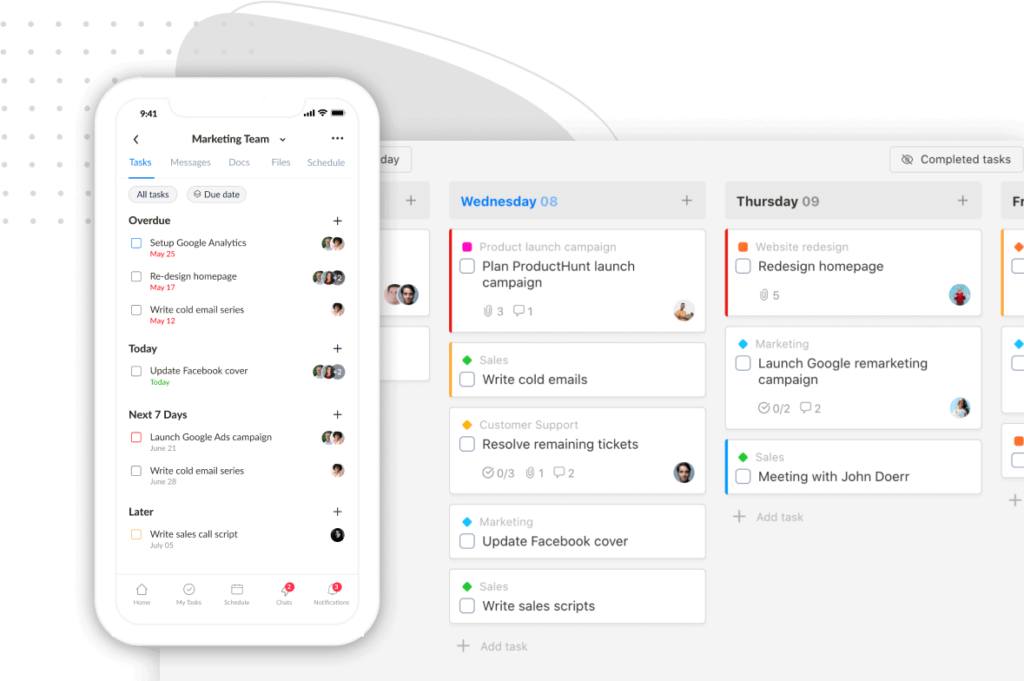Is Basecamp’s pricing too expensive for your needs? Are you seeking Basecamp alternatives with a broader feature set and greater customization to better meet your requirements?
If so, you’re in the right place!
Whether you’re looking for budget-friendly options, alternatives with more robust feature sets, or want to improve collaboration with clients, we have the best recommendations for you.
I. Why is Everyone Leaving Basecamp?
Based on user feedback and real experiences, here are the reasons why people are exploring alternatives to Basecamp:
1. Lack of a Free Version
Basecamp doesn’t offer a free plan, making it less accessible for budget-conscious individuals or small teams looking for cost-effective project management solutions.
2. Expensive Pricing
Basecamp’s pricing structure can be a significant turn-off, especially when you compare it to more affordable alternatives. Basecamp’s per-user plan costs $15 per month, and the unlimited-user plan skyrockets to a whopping $349 per month.
3. Missing Advanced Features for Task Management
Basecamp falls short in providing advanced task management features, such as task tags, filters, start and due times, and even priorities – features that are commonly available in many free project management tools.
4. Limited Scheduling Capabilities
Basecamp’s Schedule tool is essentially just a monthly agenda with basic daily task lists.
And to make matters worse, it offers one-way integration with Google Calendar, meaning that users can’t sync their Google Calendar events to Basecamp’s Schedule.
This raises doubts about Basecamp’s promise of ensuring “no one misses anything important – ever.”
5. Limited Customization Options
If you’re looking to tailor your project management workflows to your specific needs, Basecamp’s rigid design might leave you feeling stifled.
Read more: Basecamp’s pros and cons.
When considering your project management and collaboration needs, it’s essential to weigh these limitations against your goals.
With many alternatives offering better pricing, more advanced features, and greater flexibility, leaving Basecamp might just be the strategic move your team needs.
III. 16 Best Basecamp Alternatives for Better Project Management
1. Upbase
If you love Basecamp for its simplicity, you won’t regret making the switch to Upbase. It’s much like Basecamp but with a twist—a twist that gives you more, costs you less, and is delightfully intuitive.
What Makes Upbase The Best Basecamp Alternative?
Here are 4 main reasons more and more people switch to Upbase:
A. Familiar Project Management Approach
Here is what a project looks like in Basecamp:
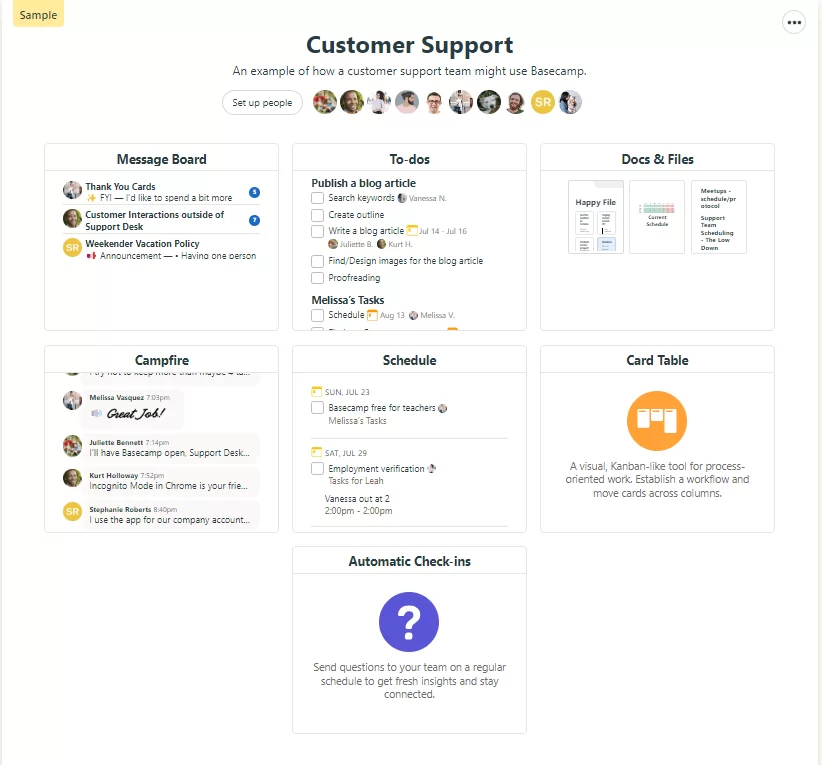
You see that each Basecamp project resides on a single page with every piece of information organized. This approach helps everyone in a project team know where to find what they need.
Next, here’s what a project looks like in Upbase:
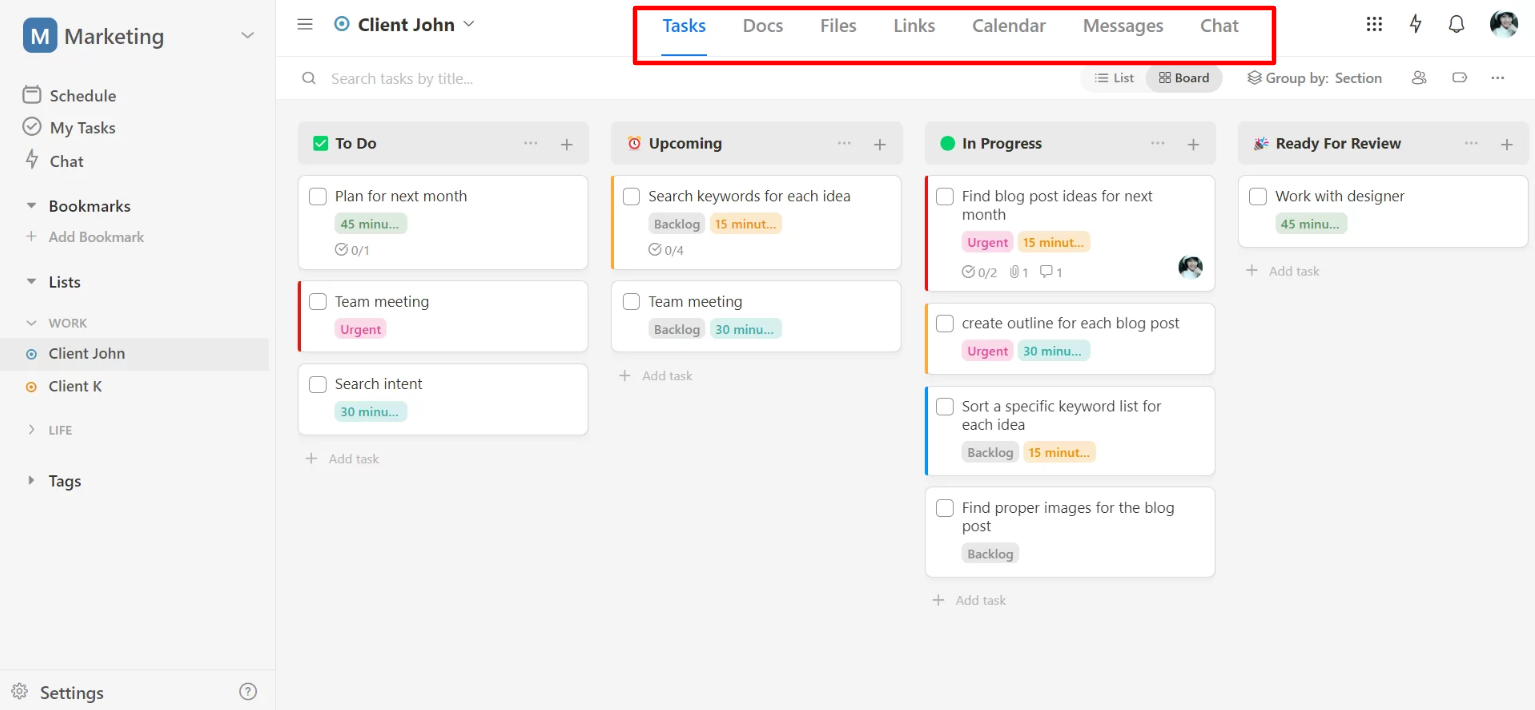
Similar to Basecamp, Upbase keeps each project on a single page with 7 different tools, easily switched by a click.
However, Upbase takes it a step further with a left sidebar, making it more straightforward to switch between projects, not clicky like Basecamp.
It also lets you customize each list’s icon, color, and even organize lists into folders for enhanced intuitiveness.
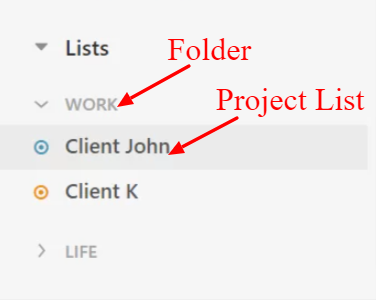
B. Extensive and Intensive Features
Upbase offers more extensive features than Basecamp.
Just look at this feature comparison table between the two apps, and you’ll understand:
|
Feature |
Upbase |
Basecamp |
|---|---|---|
|
-Start and due dates -Recurring tasks -Activity logs |
✅ |
✅ |
|
-Task notes -Assignees -Comments -Attachments |
✅ |
✅ |
|
-Start and due times -Task priorities -Task tags -Show/hide completed tasks |
✅ | |
|
-Chat -Message board -Docs and Files tools -Monthly calendars |
✅ |
✅ |
|
Client access |
✅ |
✅ |
|
-Hourly/daily/weekly calendars -Daily/weekly planners -Time-blocking |
✅ | |
|
-Connection with Google Calendars |
✅ (two-way sync) |
✅ (one-way sync) |
|
-Embed Google Drive folders |
✅ |
✅ |
|
Embed Google Docs/Sheets/Slides |
✅ | |
|
Bookmark |
✅ (internal & external links) |
✅ (internal links) |
|
-Pomo timers & ambient sounds -Notepad -Daily journal tool |
✅ | |
|
-Dark mode -Keyboard shortcuts |
✅ |
But it doesn’t stop there; Upbase offers more intensive features compared to Basecamp.
I’ll compare similar tools in both apps to provide you with a better idea.
Working with clients: Upbase vs. Basecamp
Similar to Basecamp, Upbase adopts a private-by-default approach. It’s a real game-changer, especially when compared to the public-by-default strategy most of our competitors employ.
The magic here is that this approach puts client privacy and data security right at the forefront.
The magic here is that this approach puts client privacy and data security right at the forefront. In other words, everything from client interactions to project discussions and shared documents is locked down and accessible only to authorized individuals.
This approach aligns with the needs of agencies and businesses that take client confidentiality seriously.
But that’s not all.
Upbase also focuses on simplicity.
Its user interface is designed to be intuitive and user-friendly, making the onboarding process for clients a walk in the park. Your new clients will easily get the hang of Upbase’s features, so they can jump right into your ongoing projects.
Upbase’s “Tasks” vs. Basecamp’s “To-dos”
Both tools serve the same function – task management.
However, Upbase’s Tasks provide two task views: Lists and Kanban Boards, easily switched with a simple button.
On the other hand, in Basecamp, you need to leave the To-dos page to access the Card Table page—a rather cumbersome process.
But here’s the real difference:
Upbase offers many advanced task management features that Basecamp lacks, such as:
- Start and due times
- Tags
- Priorities
- Sorting & filtering
- Ability to show/hide completed tasks.
Remarkably, Upbase’s task tag filtering is the most robust in the realm of project management software. You’ll be hard-pressed to find another option that offers multiple-tag filtering abilities like Upbase.

Upbase’s Calendar vs. Basecamp’s Schedule
Both tools are designed for scheduling tasks within projects.
However, Upbase’s Calendar offers a far more robust set of features, including three views: Weekly Planner, Weekly Calendar, and Monthly Calendar.
In contrast, Basecamp’s Schedule provides only a simple monthly agenda with basic daily task lists:
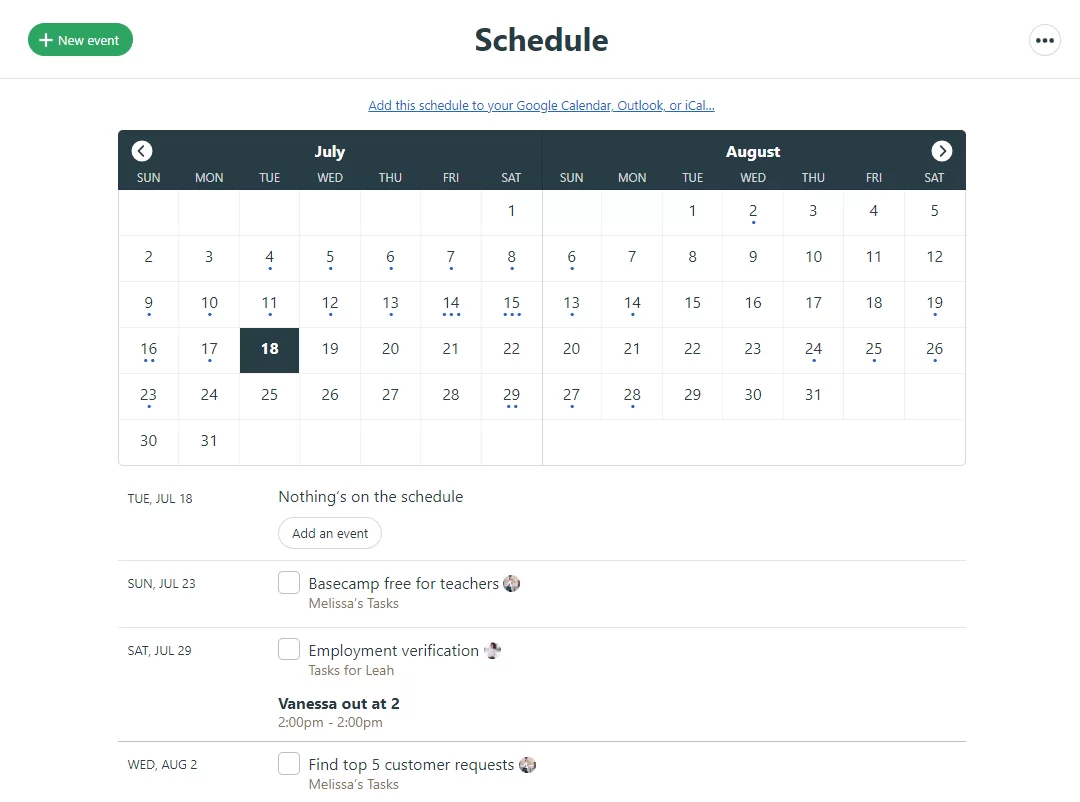
Additionally, Upbase has a Schedule tool that allows you to easily plan and schedule tasks across all the projects you’re involved in a workspace.
But that’s not all.
While both tools offer integration with Google Calendar, Basecamp falls short in allowing users to sync Google Calendar events into its calendar.
In contrast, Upbase offers two-way sync, enabling you to sync tasks with your Google calendars and vice versa.
It also allows you to connect with as many Google Calendar accounts as you need.
And the best part?
Upbase preserves the original color codes of the synced events on its calendars.
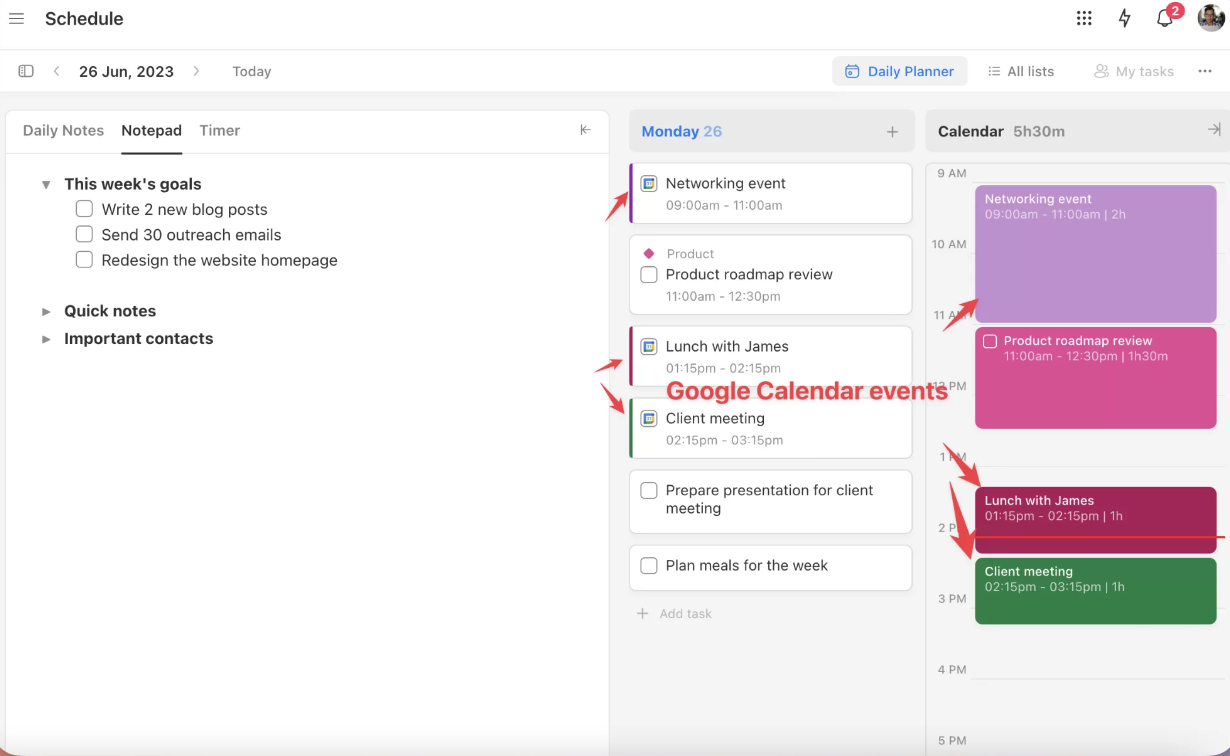
Upbase’s Chat vs. Basecamp’s Campfire and Pings
Both tools are designed for organizing team and client conversations. But Upbase’s Chat stands out for its quick accessibility.
You can easily navigate to this tool with a simple click, regardless of your location within the app. Here are 3 ways to access Chat.
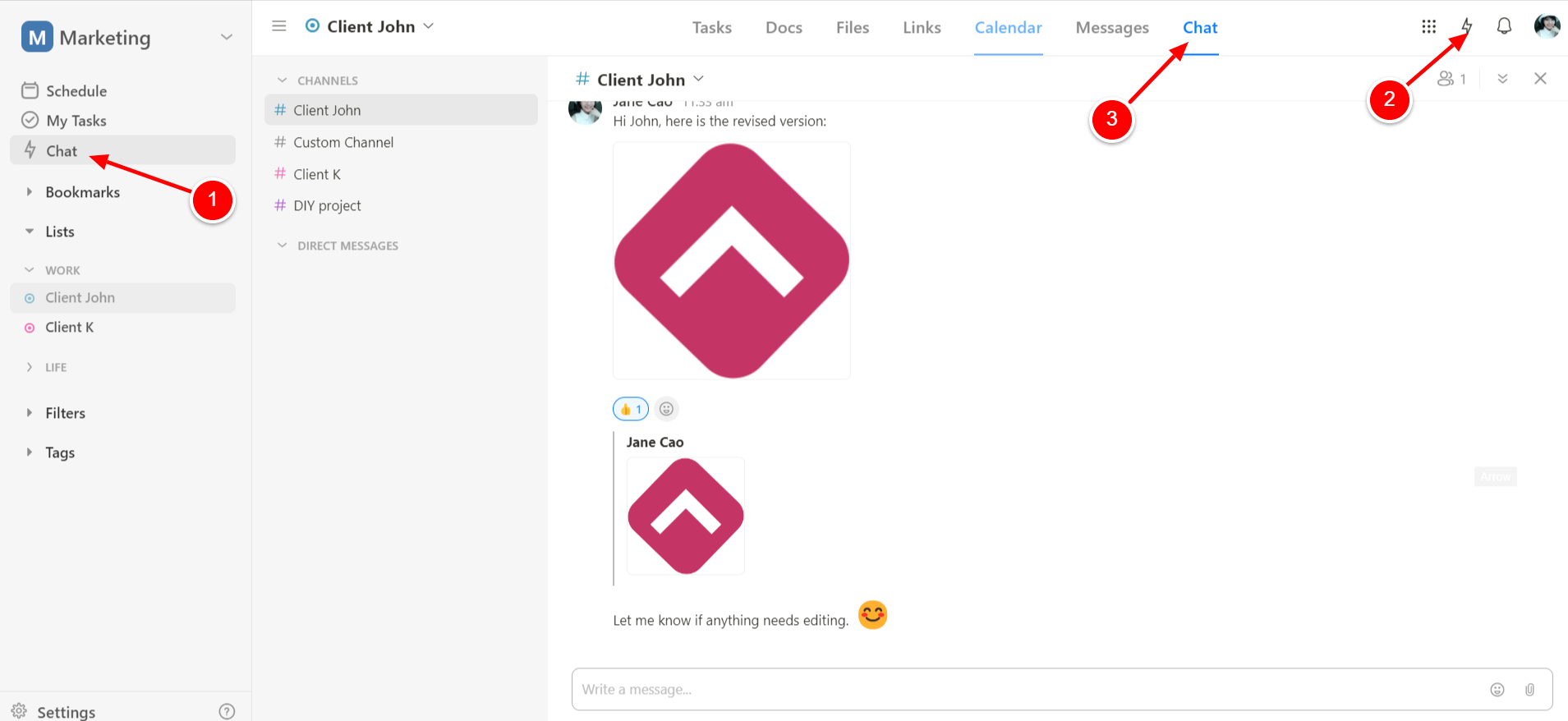
In contrast, Basecamp is quite cumbersome when switching between Campfire and Pings or even between different Campfire discussions.
Upbase’s Chat also includes some add-ons that enhance the user experience, such as:
-The ability to reply to messages within chats.
-Quick access to all sent files and links within a chat.
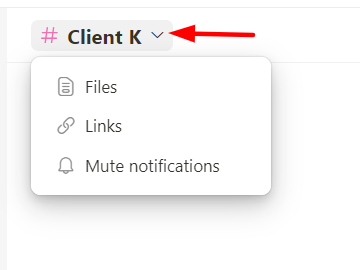
And…have you noticed that, despite its broader feature set, Upbase maintains an intuitive and user-friendly interface?
C. Easy to use for both solo users and teams
While Basecamp shines in team collaboration, it can feel overwhelming for solo users. Upbase bridges this gap by providing a versatile experience suitable for both individuals and teams.
For example, you can hide unused tools.

You can access personal productivity tools like Pomodoro timers, Notepads, and daily journals.
Additionally, you can take advantage of the “My Tasks” page and the Mini-Tray feature. Personalize your work management with customized task views using Filters.
D. Generous free plan.
Upbase offers a generous free-forever plan with unlimited users, tasks, and storage.
What’s more?
Upbase’s Premium plan and Lifetime plan options are significantly more budget-friendly for individuals and small teams than Basecamp, ensuring you get the most value without breaking the bank.
Pricing
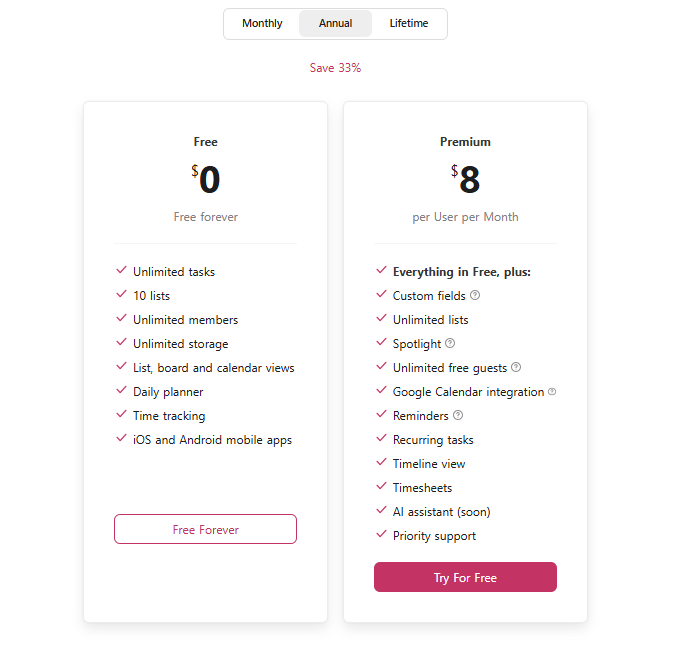
2. Teamwork
Seeking a Basecamp alternative with a broader range of features and capabilities? Teamwork might be your perfect fit.
Compared to Basecamp, Teamwork takes project planning and management to the next level.
It offers advanced project management features, robust task management capabilities, and extensive customization options, enabling it to handle complex projects effectively.
In fact, Teamwork is the preferred choice of many creative teams in simplifying project management processes and achieving better results.
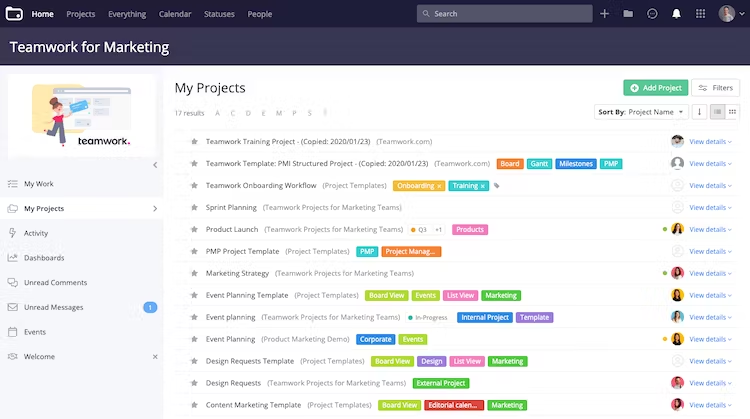
But that’s not all.
Teamwork isn’t just a project management platform; it’s also a powerful collaboration tool.
You can easily assign tasks to team members, engage in threaded discussions within tasks, and have real-time conversations—all in one place.
With Teamwork, you get more than an alternative to Basecamp; you get a comprehensive solution that maximizes productivity and collaboration.
Key Features
- Daily, weekly, and monthly calendars
- Multiple project views: List, Table, Boards, and Gantt charts
- File sharing and storage
- Time tracking
- Real-time messaging
- Task dependencies
- Project templates
Limitations
- Steep learning curve
- Excessive notifications
- Minimum of 3 users for all the paid plans
Pricing
This project management system offers multiple pricing tiers, including a free plan with basic features and 4 paid plans.
The prices ranging from $5.99-$19.99 per user/month (billed annually):
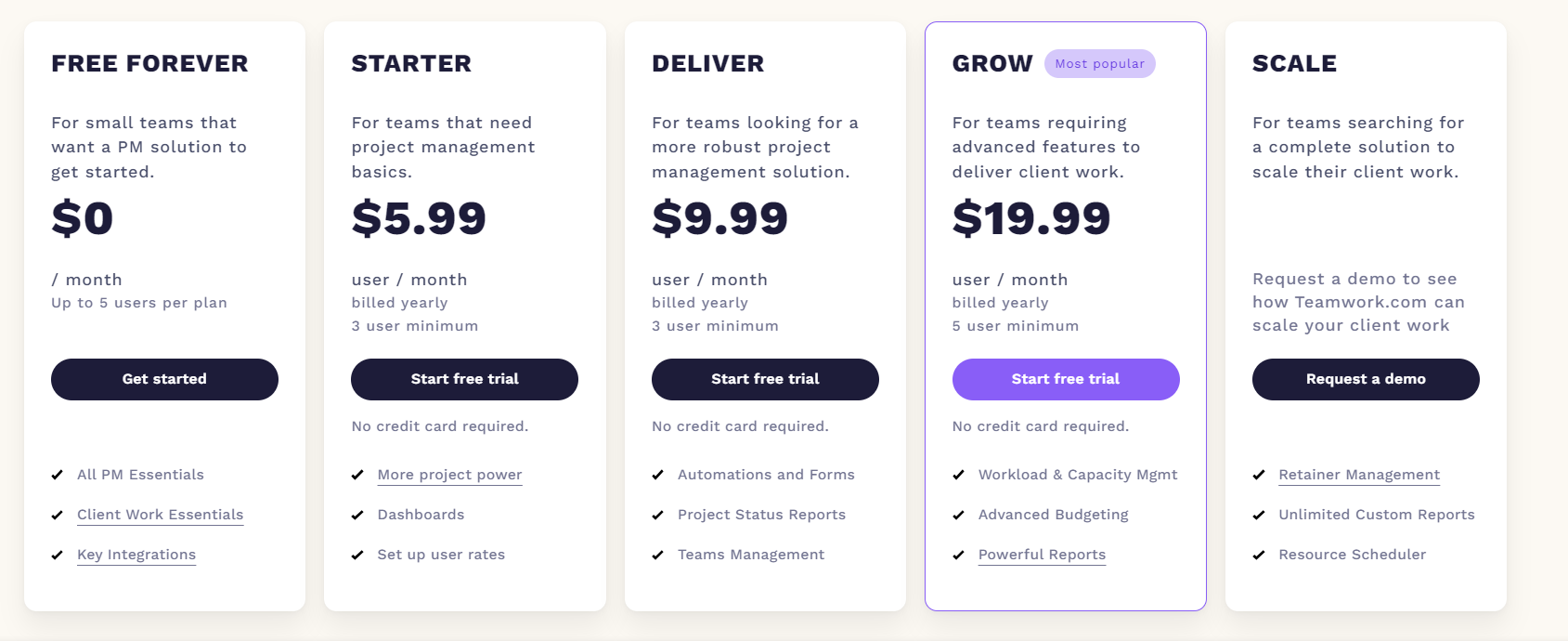
Meanwhile, the monthly subscriptions cost from $8.99-$25.99 per user/month:
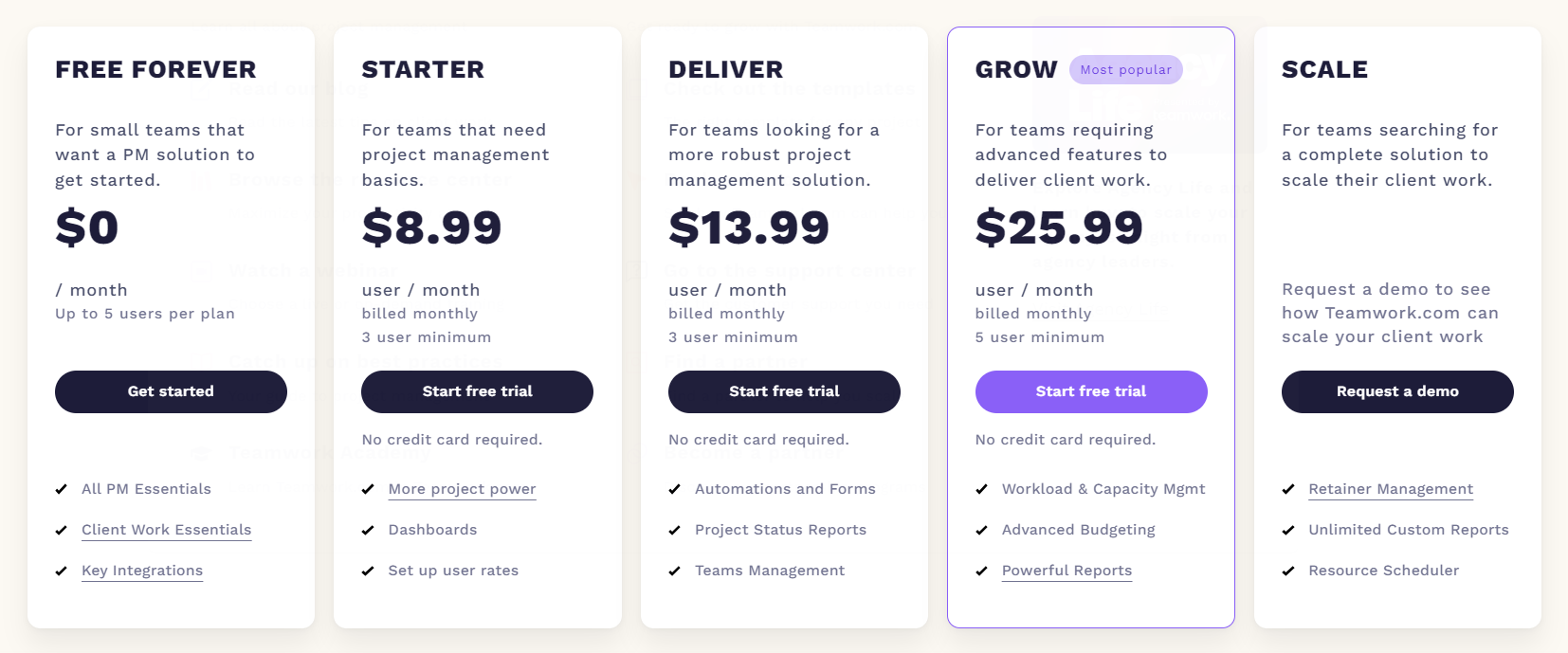
3. Zoho Projects
Our next Basecamp alternative option is Zoho Projects.
This project management tool shines in three key areas:
1. Extensive customization. You have the power to create customized workflows, templates, and fields to match your unique needs.
2. Advanced project planning. Zoho Projects boasts features like task dependencies, Gantt charts, and resource allocation, making its easy to plan intricate projects.
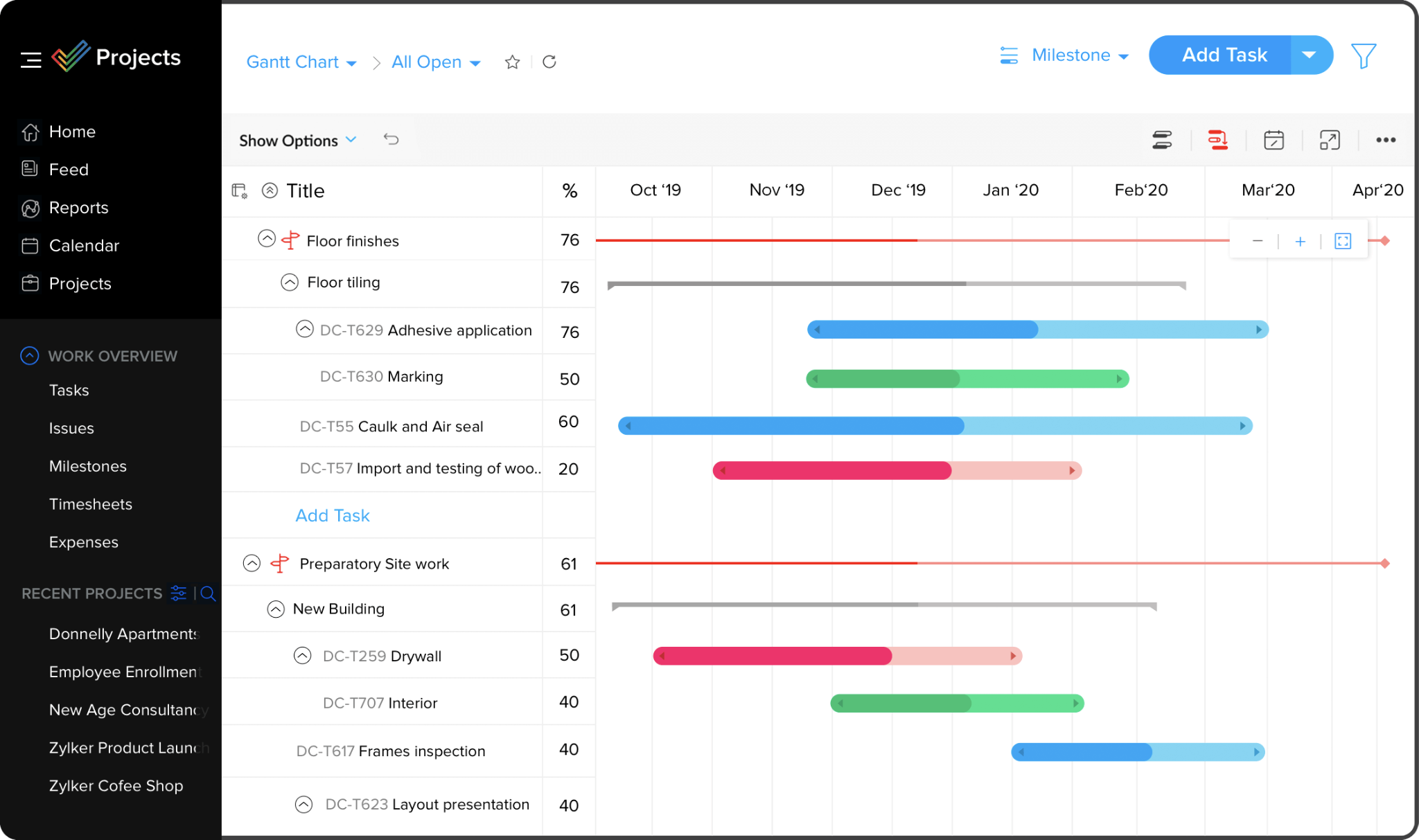
3. Robust time tracking capabilities. This enables a project team to gain precise control over project progress and resource allocation.
But Zoho Projects doesn’t stop at project management; it’s a great collaboration tool, too. Engage your team with discussions, a comment box, and a team feed, all within a single platform.
Plus, it integrates seamlessly with Zoho Cliq for real-time chat.
In summary, Zoho Projects is the ultimate solution for organizations and project managers on the hunt for a Basecamp alternative with advanced project management needs.
It offers the customization, planning, and collaboration features you need to elevate your projects to new heights.
Key Features
- Task management: to-do lists, subtasks, task dependencies, etc.
- Time tracking: Timers, reminders, project planned & actual
- Calendar & Gantt charts
- Project feeds
- Issue reports
- Project budgeting
Limitations
- Too limited free users and storage capacity
- Difficult to learn and use
- Less intuitive interface, compared to other Basecamp alternatives
Pricing
Zoho Project offers a free plan with 3 users, 2 projects, 5GB of storage space, and basic project management features.
The two paid plans include:
- Premium—$4-$5 per user/month—offers unlimited projects, 100GB of storage space, and advanced features.
- Enterprise—$9-$10 per user/month—offers unlimited projects, 120GB of storage space, and full features.
Each paid plan comes with a 10-day free trial.
4. ProjectManager
For those project managers who find Basecamp is no longer able to handle their increased workload or the number of team members efficiently, ProjectManager – with its great scalability – might be a good alternative.
It is well-suited for managing projects of all sizes, from basic to complex.
Whether you’re managing straightforward projects with simple to-do lists or highly intricate projects with complex project timelines and detailed resource planning, ProjectManager provides the scalability to accommodate diverse project types.
It also provides portfolio management features that allow you to oversee and track progress in one centralized dashboard.
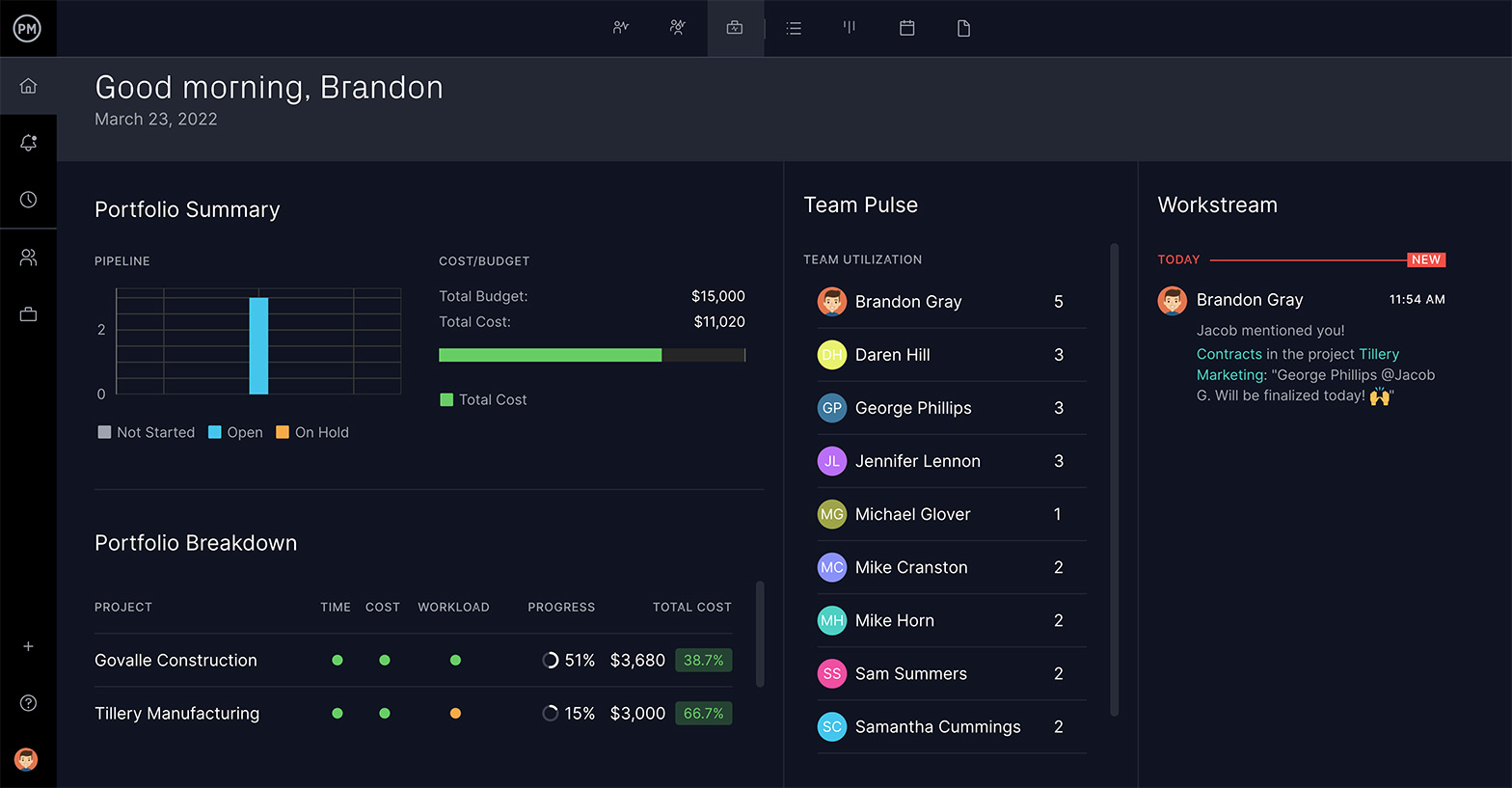
But take note that collaboration is not the strength of ProjectManager.
There’s no feature like real-time chat or message board. Instead, you can only assign tasks to multiple team members, share files, and or create threaded discussions.
Key Features
- Gantt, List, Board, Calendar, and Sheet views
- Project dashboards
- Recurring tasks
- Resource management
- Risk management
Limitations
- No free plan
- Limited storage capacity
- Expensive pricing
Pricing
This project management tool offers three paid plans, each with a free trial:
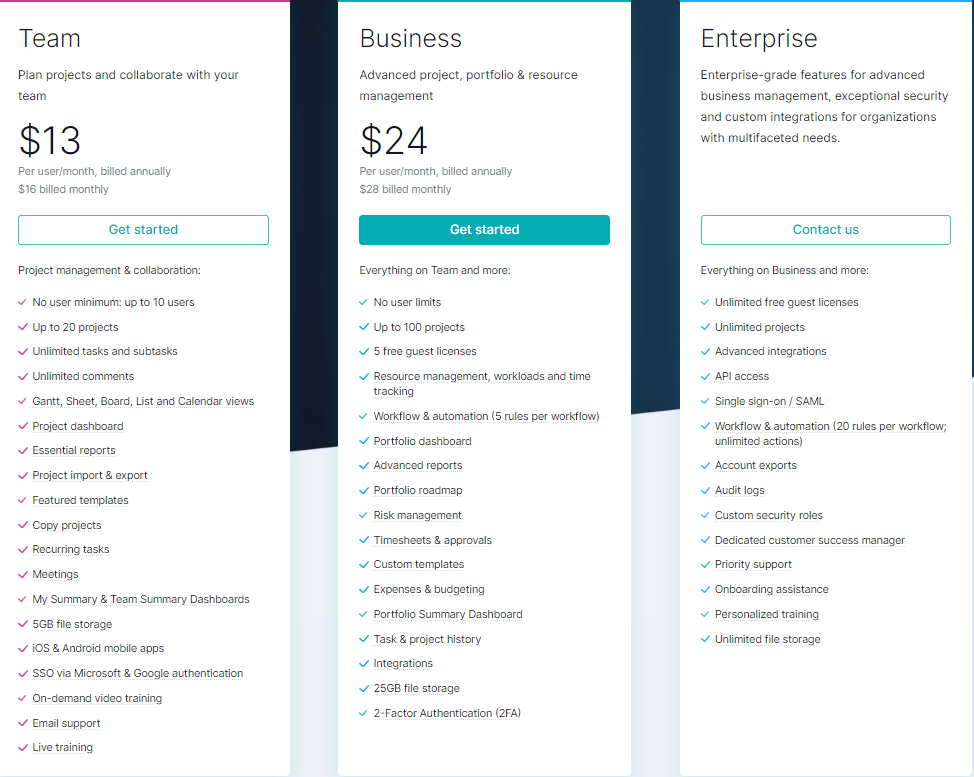
5. Freedcamp
Freedcamp wins over Basecamp in many aspects: a free plan, more extensive task management capabilities, and more customization options.
But the most notable thing is:
Freedcamp strikes a balance between project management and collaboration.
It offers all the features that most project managers might need for seamless teamwork, such as discussions, file-sharing, custom workflows, task priorities, deadlines, etc.
This makes it an ideal Basecamp alternative for those looking for an all-in-one solution to manage tasks and projects but on a tight budget.
On the flip side, Freedcamp has certain limitations. A typical example is its interface, which is not as polished or streamlined as Basecamp in terms of design. Additionally, it has no real-time chat tool.
Key Features
- Task management: task lists, due dates, priorities, and Kanban boards.
- Collaboration: discussions, file sharing, and email-to-task conversion
- Document management
- Portfolio management
Limitations
- Unable to set permissions (This could be a problem for any creative team working with multiple clients.)
- Interface design not as streamlined as Basecamp
- Limited free users and storage capacity
Pricing
This project management tool offers a free plan with limited features. The paid version includes Pro, Business, and Enterprise Plans—each with a 14-day free trial.
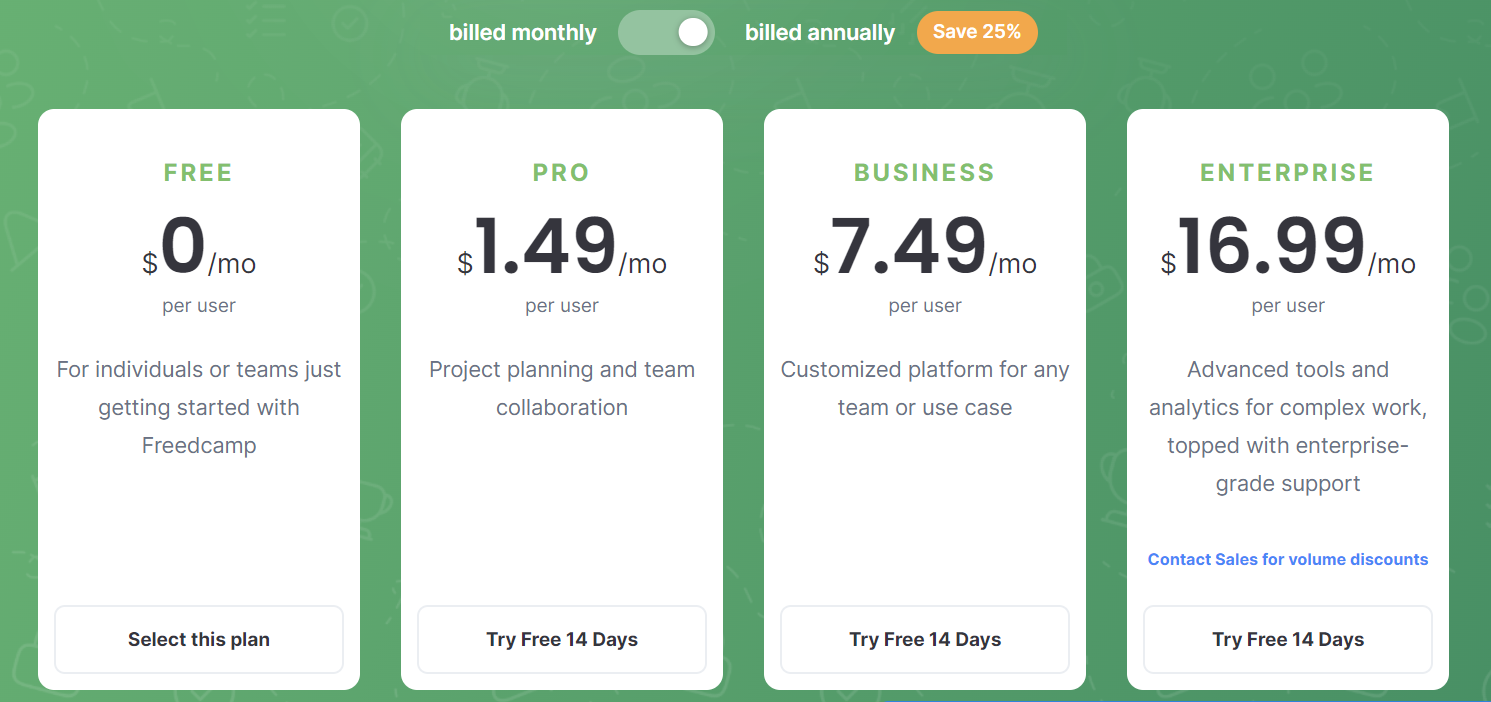
6. ClickUp
ClickUp is known as a robust project management and team collaboration software with incredibly extensive customizability.
Its extensive feature set includes task management, team communication and collaboration, and in-depth reporting.
Additionally, it offers custom task statuses, templates, and workflows, catering to diverse project management needs.
ClickUp is a powerful Basecamp alternative that helps you manage tasks, track progress, and oversee complex projects efficiently.
But it’s worth noting that ClickUp’s extensive capabilities may lead to a steeper learning curve for new users.
In fact, many people have shared that they become lost in too many options and settings.
Additionally, ClickUp’s interface, while powerful, can be overwhelming for straightforward tasks, and its pricing structure could become costlier as teams expand.
Key Features
- Subtasks, dependencies, custom fields, and time tracking.
- Team communication and collaboration: task comments, chat, native email, and discussions.
- Customization: custom task statuses, templates, and workflows
- Dashboards and reports.
Limitations
- Steep learning curve
- Users may become lost in too many options and settings.
- Clunky and less intuitive user interface
Pricing
The project management app offers a free plan for individuals and three paid options for teams:
- Unlimited Plan – $7-$10/user/month
- Business Plan – $12-$19/user/month
- Enterprise Plan – contact sales

7. Microsoft Project
Microsoft Project is designed for handling intricate projects with complex resource allocation and critical path analysis. Importantly, it has capabilities Basecamp lacks.
For example, its advanced planning and scheduling features allow project managers to create a detailed project plan with precise timelines.
Microsoft Project also streamlines project tracking.
It allows team members to update task progress, marking them as complete or specifying the percentage of completion. Based on this, the project manager can easily track projects in real time.
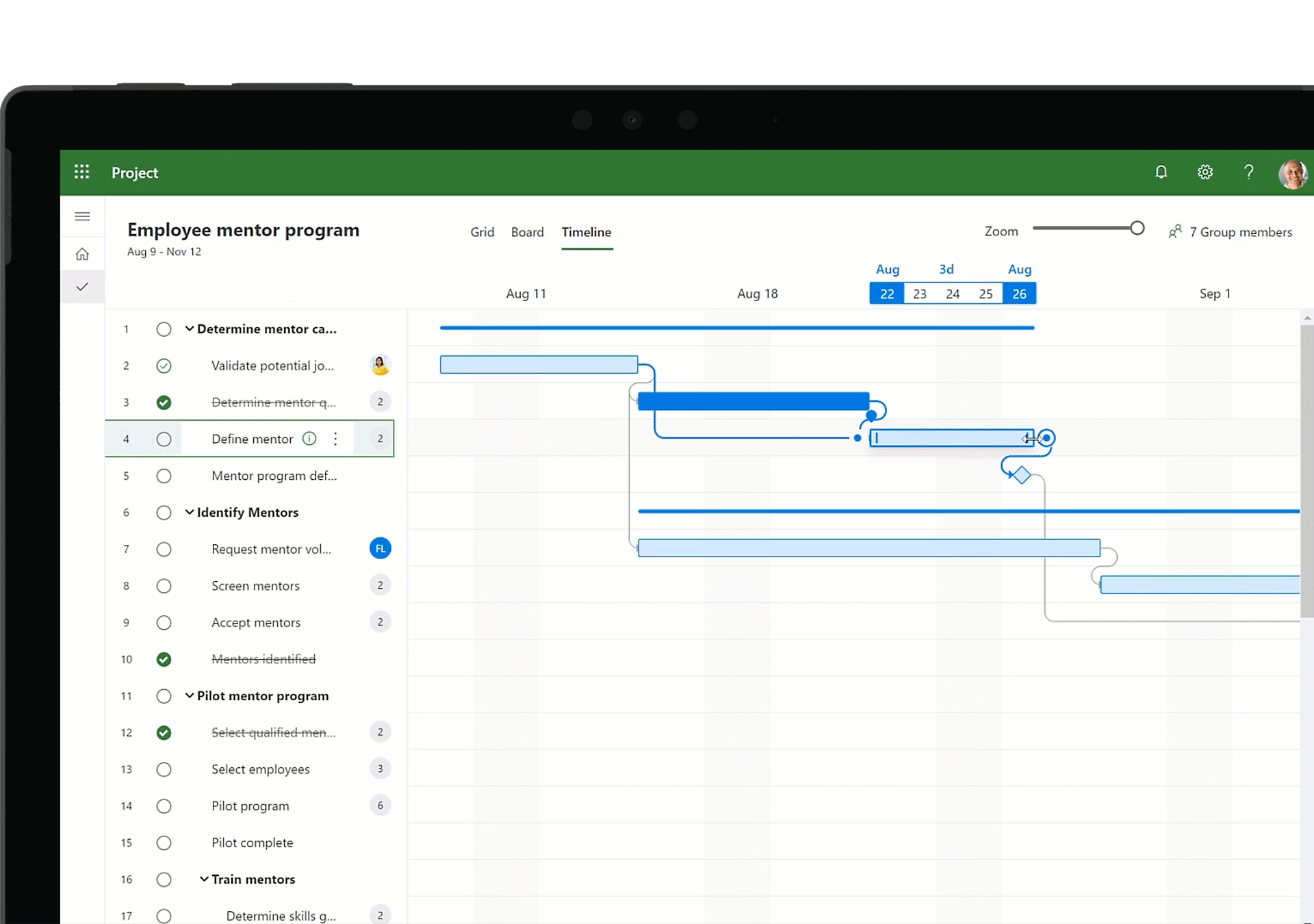
With project deliverables that include documents, designs, and reports, Microsoft Project can link to document repositories like SharePoint, ensuring easy access to project-related documents.
In short, if you’re a professional project manager or a large organization juggling multiple intricate projects at a time, Microsoft Project might be an ideal Basecamp alternative.
But if you’re a small team on a tight budget or an individual who prioritizes simplicity and real-time collaboration, look elsewhere.
Key Features
- Tasks, subtasks, and dependencies
- Gantt chart
- Resource management
- Reports and analytics
- Integration with Microsoft 365
Limitations
- Limited collaboration features
- Overwhelming for new users
- Costly for individuals and small teams
Pricing
Unlike many other Basecamp alternatives, Microsoft Project doesn’t offer a free version for individuals or small teams.
Instead, the project management app comes with three paid options, each with a 30-day free trial.
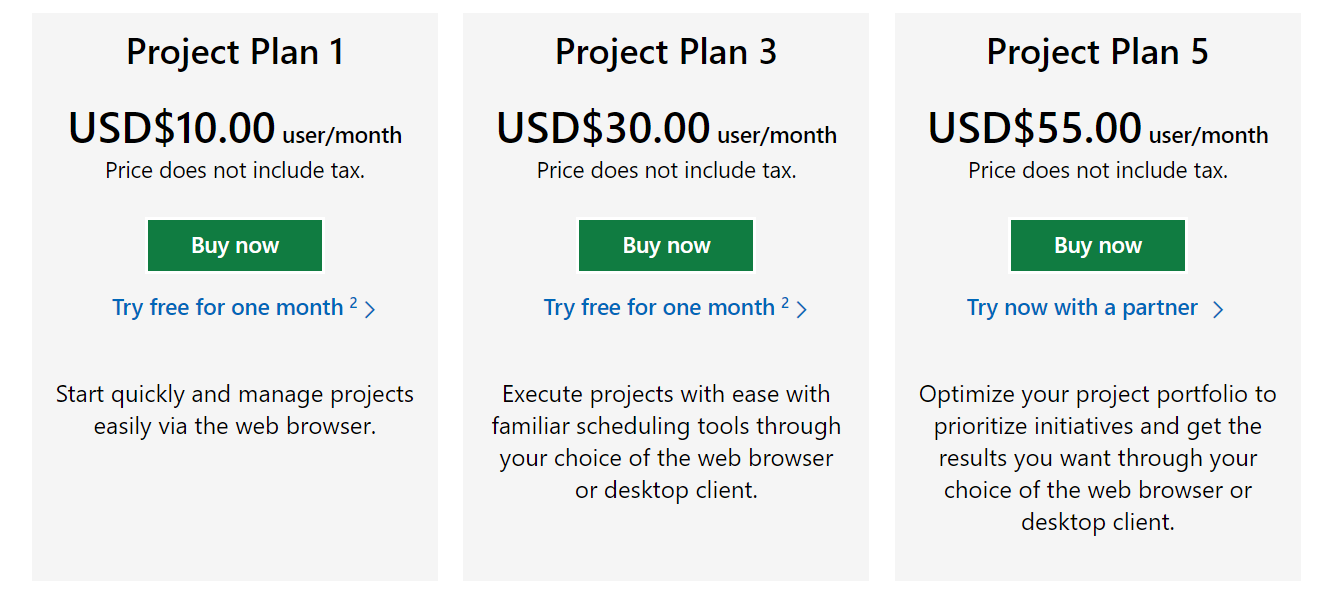
8. Notion
Looking for a Basecamp alternative that’s more than just a project management and collaboration tool? Try Notion, an all-in-one solution that combines content organization, task management, and more.
Notion’s heart lies in content creation and knowledge management.
It offers a user-friendly interface and a robust text editor tool for creating notes, wikis, and documents. On each document, multiple team members can collaborate in real-time.
Notion also supports a hierarchical structure with pages, sub-pages, and sub-sub-pages, making it ideal for creating in-depth content structures.
Combining with its extensive customization options, you can easily create custom databases, templates, and workflows tailored to your needs.
The only downsides of Notion are its steep learning curve and lack of some specialized project tracking features found in dedicated project management software.
Key Features
- Pages, sub-pages, and sub-sub-pages
- Real-time collaboration on documents
- Slash commands with various formatting options
- Board, list, and calendar views
- Templates
Limitations
- It takes time for beginners to learn
- Lack of advanced features for project management
Pricing
This free Basecamp alternative offers a free version and 3 paid options as below:
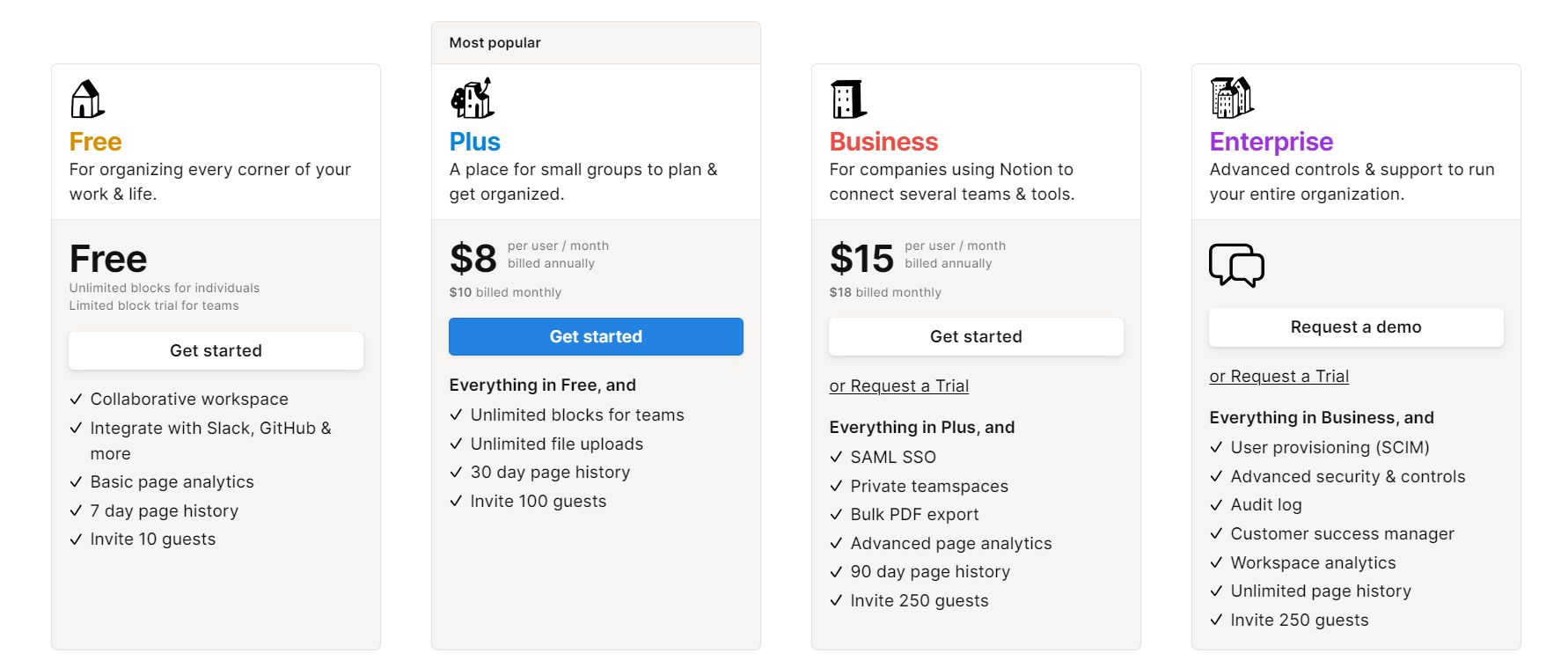
9. Trello
Trello is a straightforward project management tool known for using boards, lists, and cards to represent tasks and project phases. It also provides various theme options.
Compared to Basecamp, Trello’s Kanban-style boards are more intuitive, making it easier for teams to grasp and track projects.
In terms of functionality, Trello excels in task management. It doesn’t limit the number of collaborators on each board and allows for creating an unlimited number of task cards.
You can set due dates, assign tasks to specific team members, create checklists within cards, and attach files. This ensures clear responsibility and deadlines for each task.
So, if your primary need is simplified task management and you prefer a visual project management approach, Trello could be a fantastic Basecamp alternative.
However, it’s worth noting that Trello doesn’t offer the extensive collaboration and document-sharing features found in Basecamp.
For in-depth planning, extensive team collaboration, and knowledge sharing, seek other Basecamp alternatives. Or, you can use third-party integrations, but this way could potentially result in slow-loading issues.
Key Features
- Visual Kanban-style boards
- Recurring tasks
- Power-Ups
- Automation
- Customizable backgrounds
- Custom fields
Limitations
- Lack of time tracking
- Too basic subtask attributes
- Adding too many Power-Ups could lead to slow-loading issues
Pricing
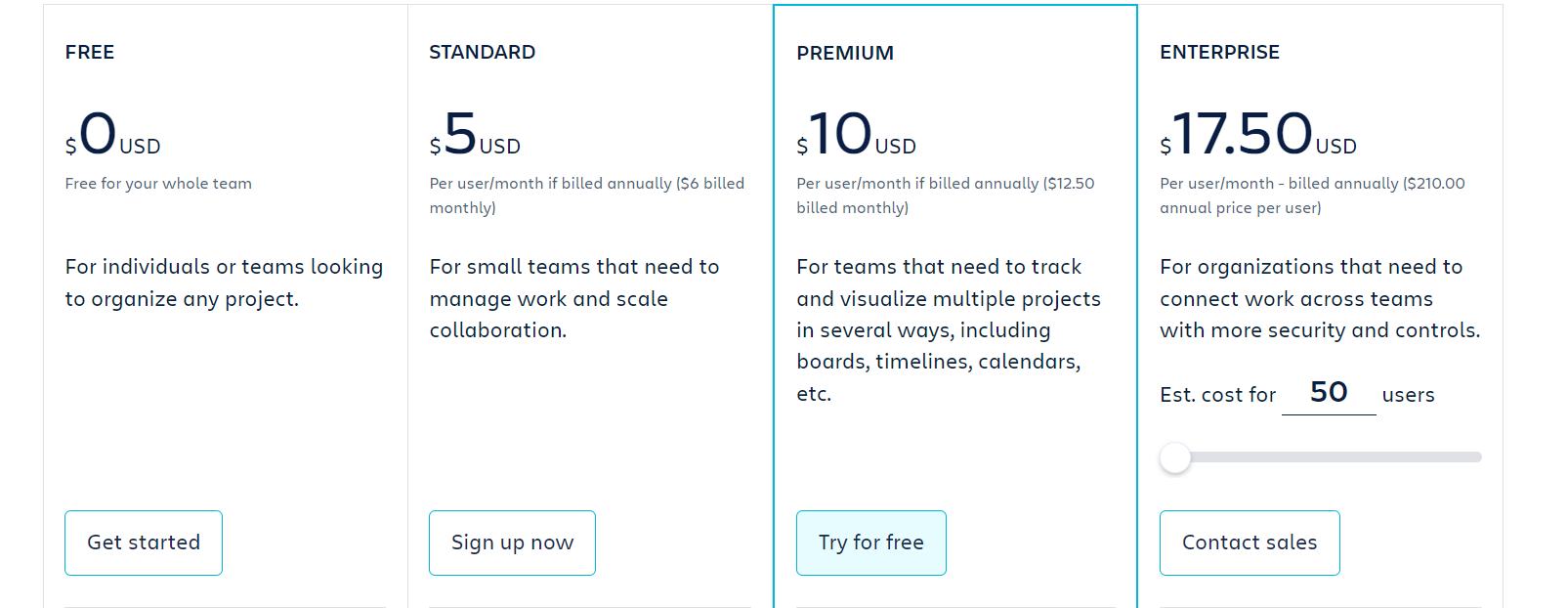
10. Jira
As one of the best project management software solutions with advanced project and issue tracking capabilities, Jira can be a valuable Basecamp alternative for software development and technical teams.
Jira’s strength lies in its specialized project management capabilities.
It offers robust features for managing complex workflows and bug tracking.
For example, you can create a software project and customize the workflow to reflect your code review, testing, and deployment processes. Then, visualize dependencies and relationships within your project.
You can also create custom fields or choose from Jira’s templates for creating detailed bug reports.
However, nothing is without drawbacks.
Jira might not be the ideal fit for those seeking streamlined and straightforward Basecamp alternatives.
The platform doesn’t offer extensive collaboration or document sharing capabilities either.
Key Features
- Recurring tasks
- Time tracking
- Custom fields
- Bug reports
- Scrum, Gantt charts, and Boards
Limitations
- Less intuitive interface
- Overwhelming for beginners to learn and use
- Steep price range
Pricing
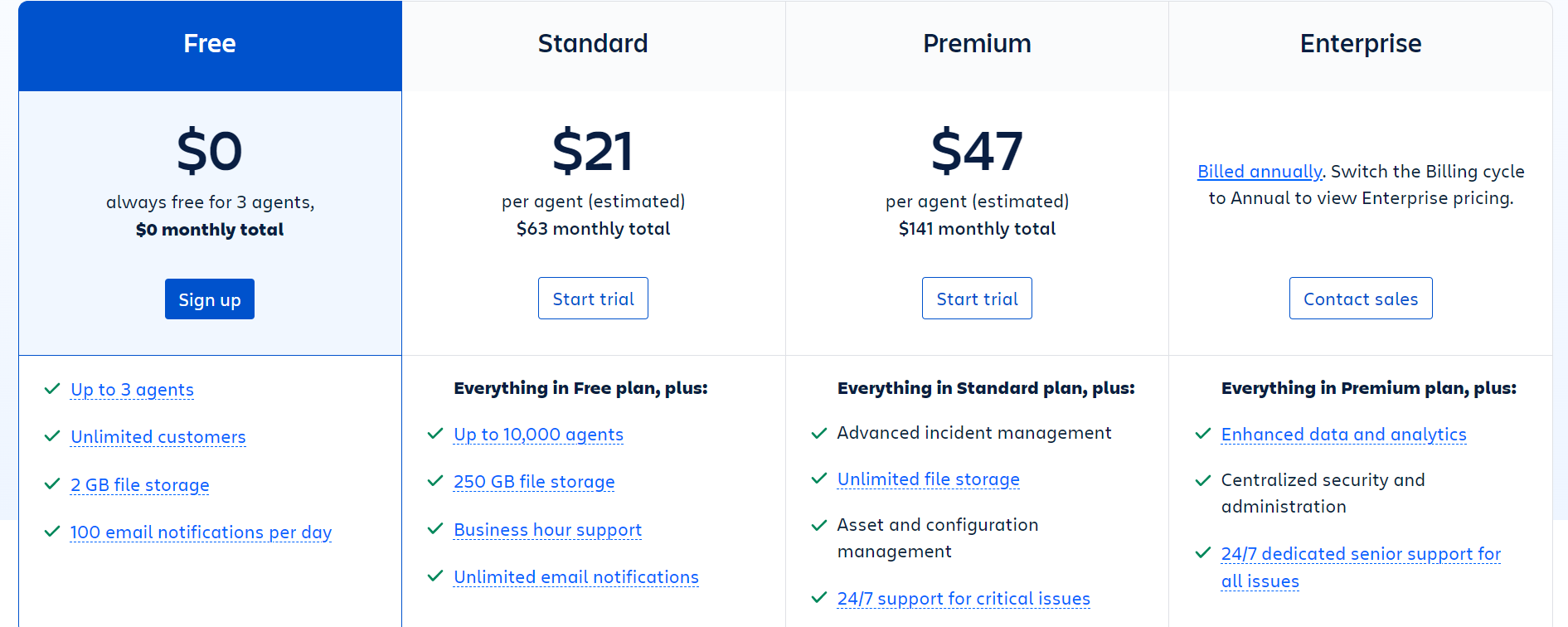
11. Airtable
Airtable is a versatile project management software solution known for its spreadsheet-like database structure.
The competitive advantage of this structure is high adaptability, allowing users to design custom workflows, tables, and fields to suit their unique needs. This makes Airtable a flexible Basecamp alternative for organizing data, managing projects, and tracking tasks.
However, such flexibility is a double-edged sword.
Airtable’s robust features and configuration options can make the platform challenging for new users to learn.
Additionally, its document management and collaboration capabilities may not be as comprehensive as those in Basecamp.
Key Features
- List, Gallery, Kanban, Form, Calendar, and Grid views
- Timelines and Gantt charts
- Time tracking
- Personal and locked views
- Automation
Limitations
- Limited storage capacity
- Expensive pricing
- High learning curve
Pricing
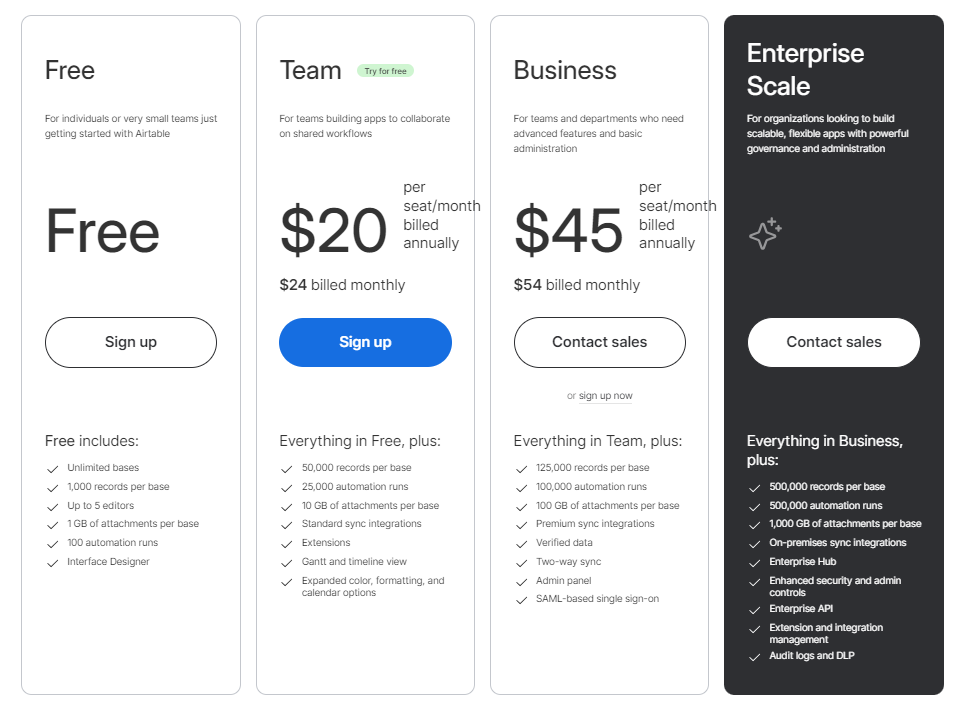
12. Scoro
Scoro stands out as a comprehensive project management solution, offering project and task management, time tracking, financial tools, and CRM features, all in one platform. This makes it one of the ideal Basecamp alternatives for large teams looking to streamline their operations.
However, there’s an important note here:
Due to its complexity, Scoro can be a real challenge for users who are not tech-savvy. Onboarding and training new hires can also be expensive and time-consuming for organizations (Scoro’s onboarding services start at $1,699).
Additionally, the project management app doesn’t offer a free plan; instead, it provides a 14-day free trial for each paid plan.
It’s also worth noting that its price range is higher than that of most other Basecamp alternatives.
Key Features
- Calendars & planners
- Task lists & boards
- Task recurrence
- Time tracking & Budgeting
- Dashboards and reports
Limitations
- Not intuitive and user-friendly
- Expensive pricing and onboarding services
- No free plan
Pricing
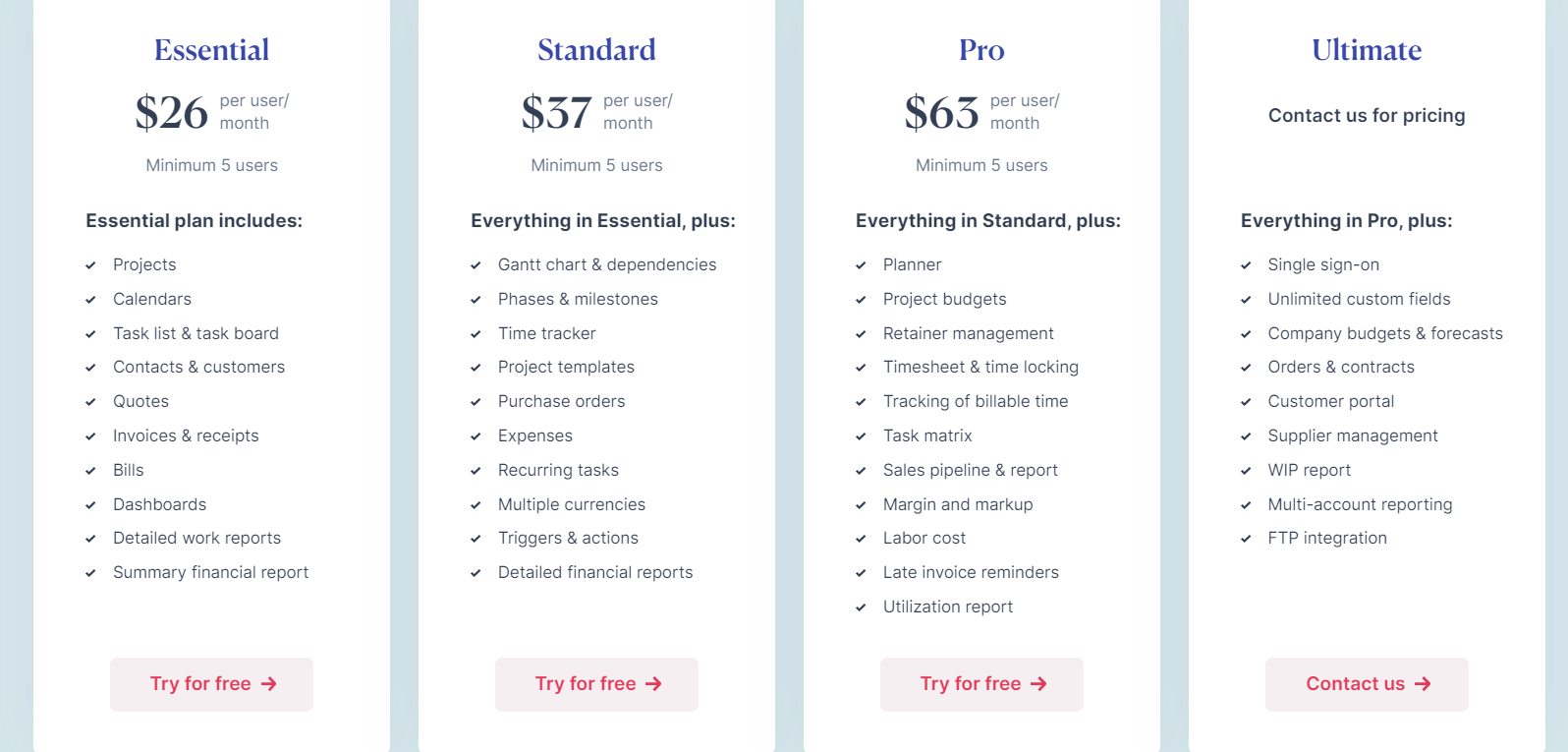
13. Paymo
Unlike other Basecamp alternatives, Paymo stands out as an all-in-one project management software solution with free time tracking and invoicing features.
It also offers a wide range of features for project management, guest collaboration, task tracking, and reporting.
Some examples include Gantt charts, resource allocation, task assignment, and the My Tasks page.
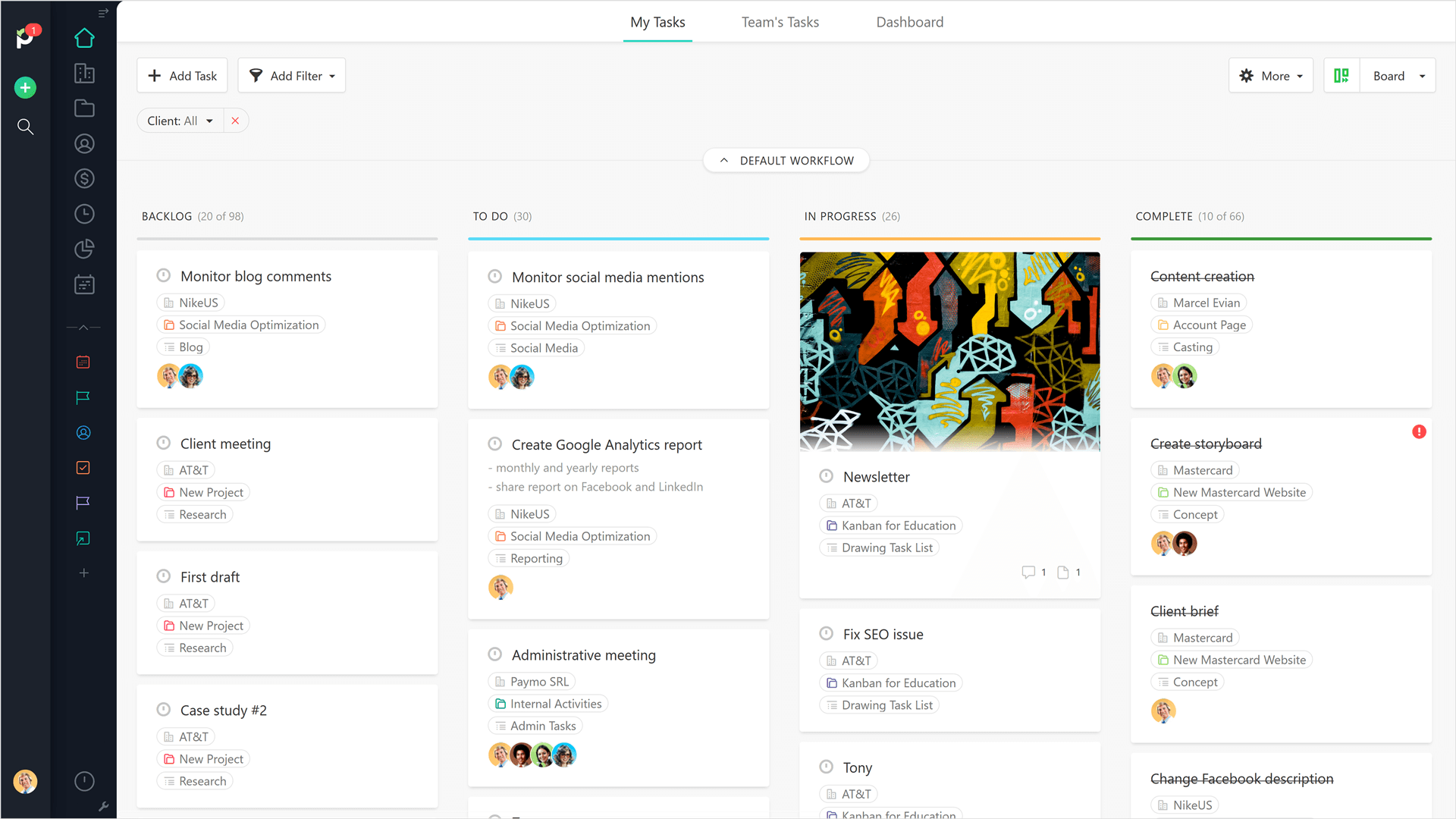
However, it’s worth noting that its free plan is more suitable for individual users due to limitations on guests and tasks.
Large teams, especially those working with multiple clients, might need to upgrade to Paymo’s paid plans.
Additionally, it’s important to mention that Paymo might not serve as robust team collaboration software. It lacks message boards and chat functionality, and its document management features are not as comprehensive as those of Basecamp.
In summary, if your needs extend beyond project management and include invoicing and time tracking in one unified solution, Paymo stands out as the best free Basecamp alternative.
Key Features
- Task Views
- Guess access
- Recurring tasks
- Time tracking & Static time reports
- Invoicing
Limitations
- Paid plans offer so limited storage capacity
- No native chat or message boards
- Lack of advanced document management features
Pricing
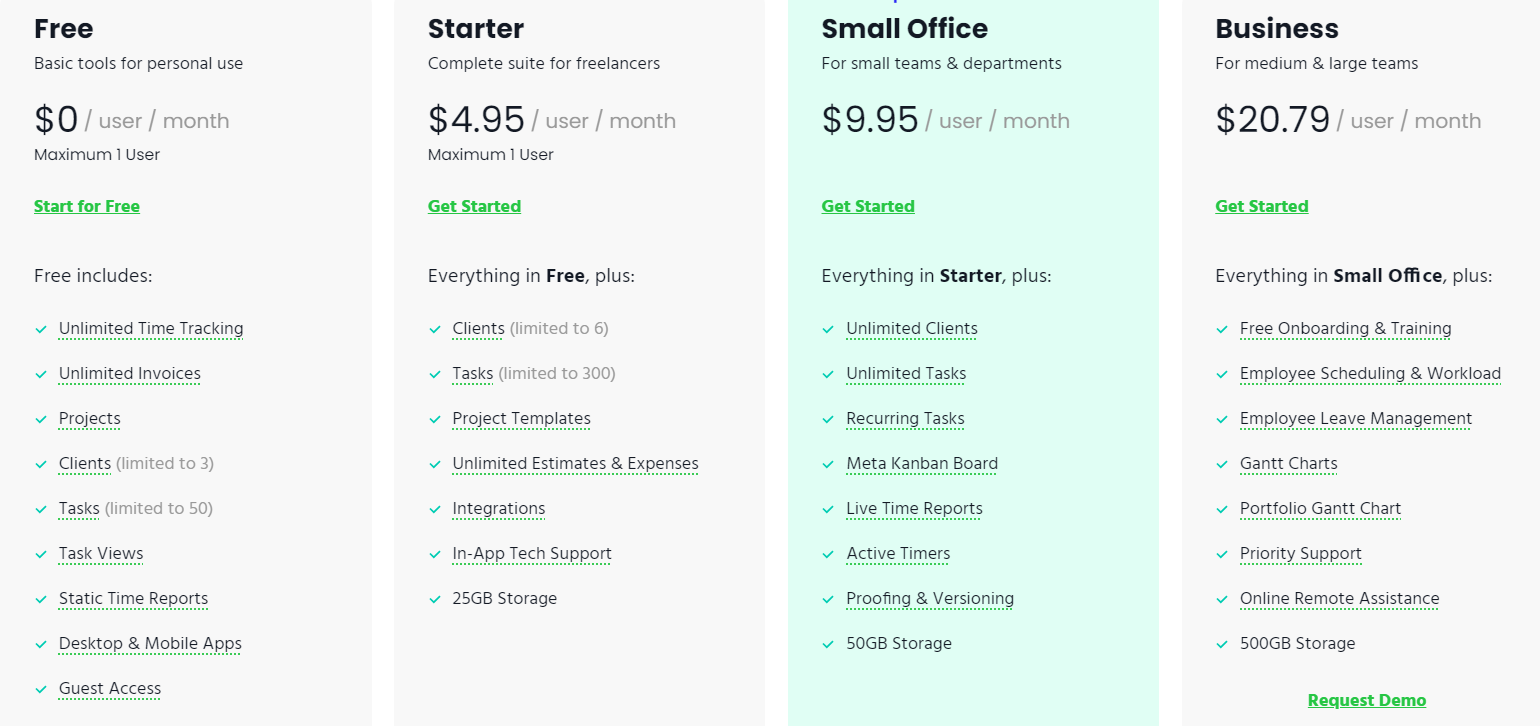
14. Podio
Podio isn’t merely a project management tool; it’s a versatile all-in-one solution with great customization. It’s much more flexible than Basecamp.
You can tailor Podio for various business processes, including project management, CRM, task tracking, and more.
This free Basecamp alternative also offers robust document management capabilities.
It allows users to upload, store, and share documents within specific workspaces or projects, control file versions, and leave comments within documents.
Unlike some Basecamp alternatives, Podio stands out for its rich integrations with popular cloud storage services like Google Drive, Dropbox, and Box.
Speaking of project management features, Podio offers task tracking, calendar views, and the ability to create custom workflows for project stages.
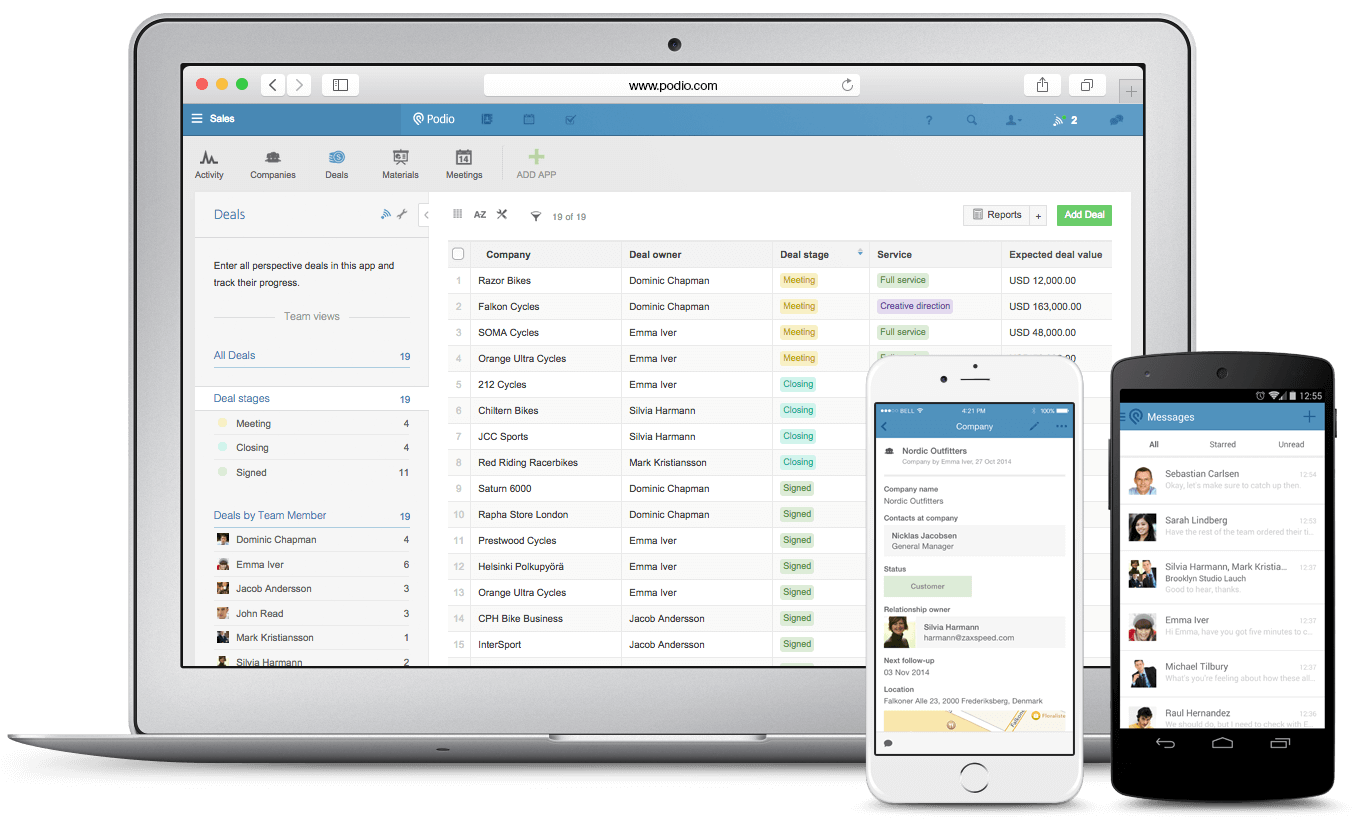
But take note that, due to its extensive customization options, Podio may have a steeper learning curve for users who need to configure it extensively.
Key Features
- Task assignment, due dates, and dependencies
- Customizable project workflows
- File sharing
- Integrations with Google Drive, Box, and Dropbox
Limitations
- Steep learning curve
- Too limited free plan
- Lack of advanced collaboration features
Pricing
Podio offers a 3-tier pricing structure, including a free plan with basic features and two paid plans with more advanced features as below:
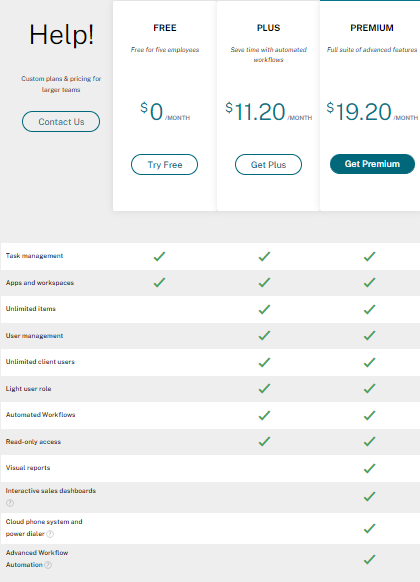
15. Merlin Project
For teams and individuals who require in-depth project tracking and resource management, Merlin Project can be one of the best Basecamp alternatives.
It offers many specialized project management tools, including Gantt charts, dependencies, critical path analysis, and templates. This makes it valuable for intricate projects in industries like construction, engineering, and product development.
But this online project management software solution doesn’t stop there. It also helps project managers in optimizing resource allocation, managing project finances, and identifying potential risks.
However, unlike other project management tools, Merlin Project is only available for Apple users, which could be a problem for teams using varying platforms.
Key Features
- Gantt charts & dependencies
- Critical path analysis
- Project templates
- Resource management
- Budgeting
Limitations
- No free plan
- High learning curve
- Designed exclusively for Apple users
Pricing
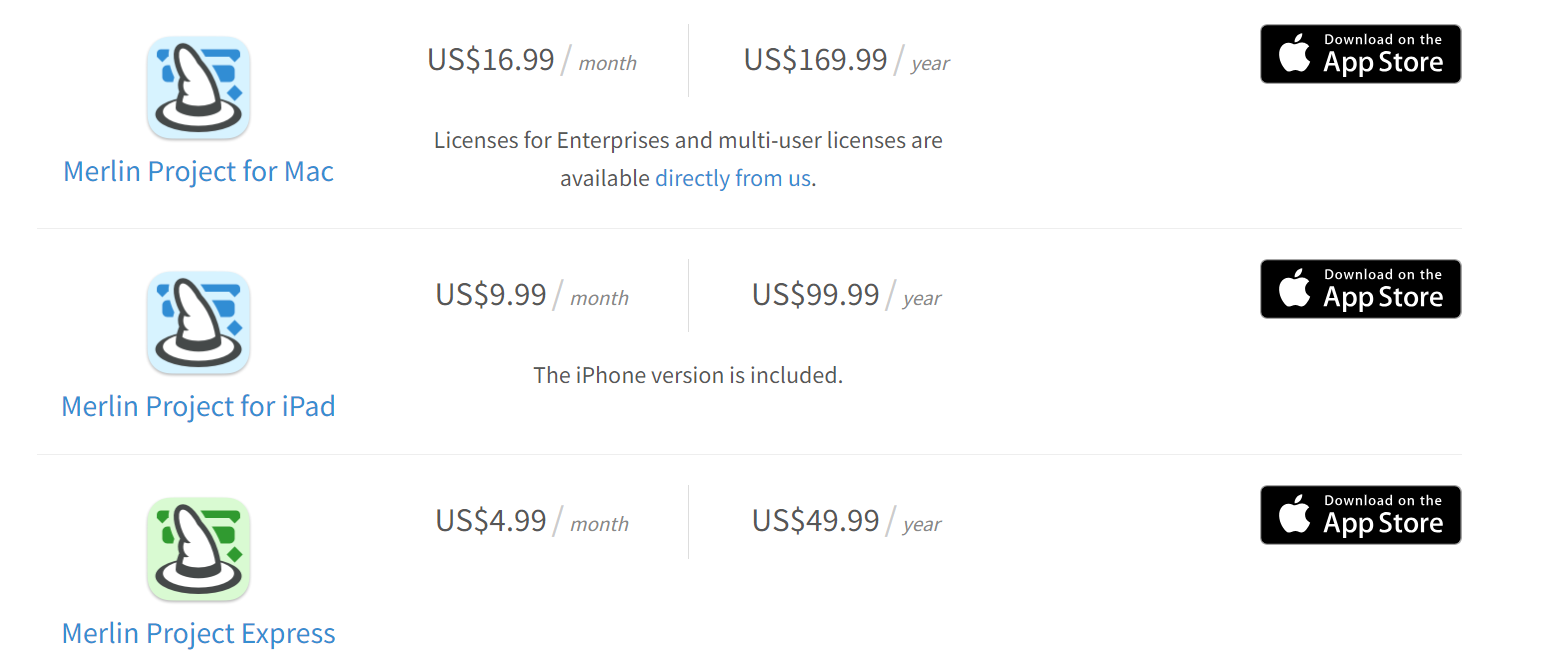
16. nTask
nTask offers no free version, and its free trial is very limited, spanning only 7 days. However, its price range is more affordable for individuals and micro-teams than Basecamp.
If your primary focus is streamlined team collaboration and simplicity, nTask could be one of the best Basecamp alternatives.
The platform boasts a clean and user-friendly interface, enabling teams to easily collaborate together, schedule tasks, and track project timelines. Additionally, it provides a basic feature set for issue management and time tracking.
Overall, nTask is a feature-rich project management and collaboration tool, well-suited for teams in search of comprehensive project control.
Key Features
- Task management: due dates, priorities, and dependencies
- Project management: timelines, Gantt charts, and project progress tracking
- Time tracking
- Issue management
Limitations
- No free version
- Too short free trial
- Lack of real-time chat tool
Pricing
The project management app offers three paid plans:
- Premium plan, $3-$4/user/month, starting with a 7-day free trial.
- Business plan, $8-$12/user/month, starting with a 7-day free trial.
- Enterprise plan requires contacting sales.
IV. Upbase – Your Best Basecamp Alternative
In a world where simplicity meets functionality, Upbase shines as one of the best free Basecamp alternatives. It retains the best of Basecamp’s simplicity while offering a broader set of highly customizable tools, catering to both individuals and teams.
Let’s not forget its generous free plan. With unlimited users and tasks, you can achieve more without straining your budget.
Without a doubt, Upbase is the smart choice for individuals and small teams in search of a superior project management solution.
So, why wait? Bid farewell to Basecamp’s limitations and make the switch to Upbase today. It’s time to take your project management to the next level!
V. FAQs
1. What are the disadvantages of Basecamp?
The disadvantages of Basecamp include its lack of a free version, expensive pricing plans, limited task management features, rudimentary scheduling capabilities, and restricted customization options.
2. Does Basecamp have a free version?
No, Basecamp does not provide a free version. Instead, it offers two pricing options: a per-user plan at $15 per user/month and a non-per-user plan ranging from $299 to $349 per month, both of which come with a 30-day free trial.
3. What is replacing Basecamp?
Upbase is one of the best Basecamp alternatives for some good reasons:
- More comprehensive features and customization while maintaining great simplicity.
- Lower pricing
- A free plan with unlimited users
All of these make Upbase easily satisfy different requirements.
